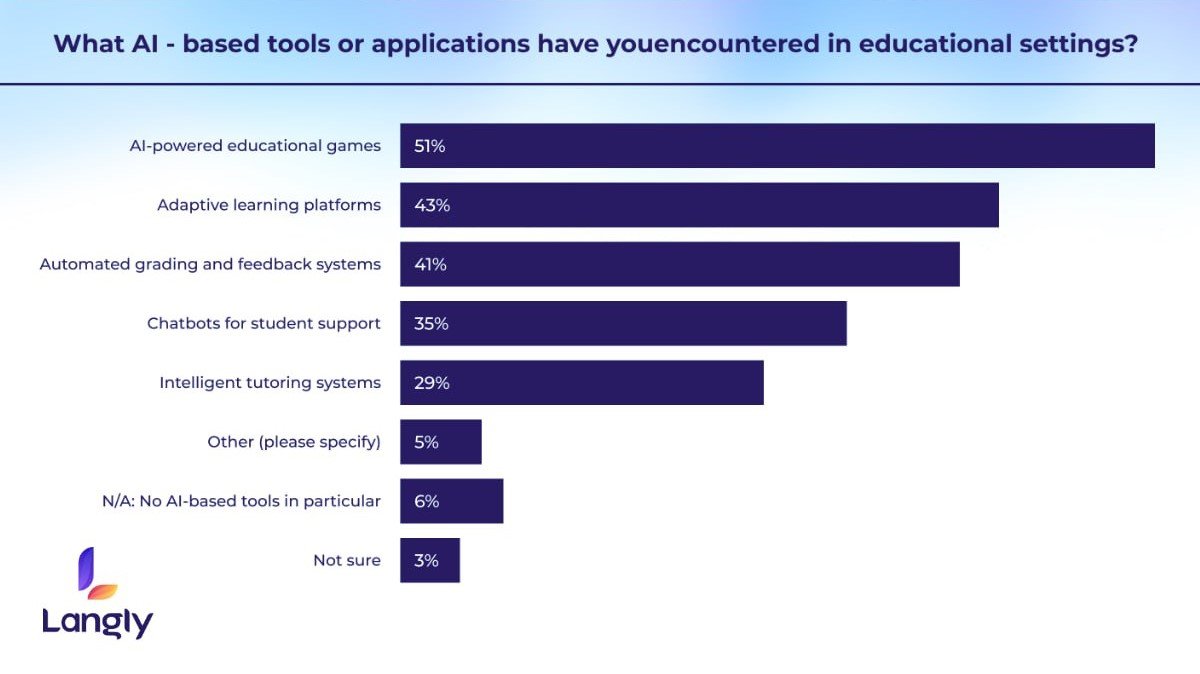Beyond Books: Quantum EdTech, AI Adventures, and Interactive Horizons
In the current era of educational discussions filled with common talks about EdTech, it's crucial to explore beyond the widely covered topics.
Feb. 22, 2024

The proliferation of artificial intelligence (AI) technologies has ushered in a new era of innovation, impacting various sectors, including education.
This transformative technology has sparked significant interest among educators, prompting extensive discussions about its potential to revolutionize teaching and learning practices.
In the end of the previous year, the renowned Forbes Advisor conducted a comprehensive survey involving more than 500 educators from diverse educational backgrounds across the United States. This survey aimed to explore educators' perceptions of AI integration in the classroom, providing valuable insights into the current state of AI in education and shedding light on educators' attitudes towards its adoption.
AI technology offers a myriad of functions that have the potential to enhance the educational experience for both students and teachers. Among the notable applications are:

AI-Powered Educational Games: Leveraging the principles of play-based learning, AI-powered educational games have emerged as effective tools for engaging students in interactive and immersive learning experiences. These games utilize user-responsive programming to deliver personalized learning content, catering to individual student needs and preferences.
Adaptive Learning Platforms: Educational technology leaders such as Carnegie Learning and Knewton have pioneered the development of adaptive learning platforms. These platforms leverage AI algorithms to analyze student performance data in real-time, allowing for the customization of learning activities and content to suit each student's unique learning trajectory. The continuous assessment provided by these platforms enables immediate feedback, facilitating a more dynamic and personalized learning experience.
Automated Grading and Feedback Systems: AI-driven grading and feedback systems streamline administrative tasks for educators, allowing them to allocate more time and energy to meaningful interactions with students. By automating tasks such as grading assignments and providing feedback, these systems enhance efficiency and accuracy, ultimately improving the overall learning experience for students.
Chatbots for Student Support: AI-powered chatbots serve as virtual assistants, providing students with immediate support and guidance. These chatbots are capable of responding to student queries, providing access to educational resources, and offering assistance with coursework. By leveraging natural language processing algorithms, these chatbots facilitate seamless communication and support for students, augmenting the learning process.
Intelligent Tutoring Systems: Intelligent tutoring systems simulate personalized tutoring experiences, providing students with individualized instruction and feedback. These systems adapt to each student's learning pace and style, offering tailored guidance and support in specific subject areas.

The survey findings revealed a generally positive outlook among educators regarding AI's impact on teaching and learning practices. Over 60% of respondents reported using AI tools in their classrooms, with younger educators exhibiting higher adoption rates. Educators recognized the benefits of AI integration, citing improved engagement, personalized learning experiences, and enhanced academic performance among students.
AI-powered educational games emerged as the most commonly used AI tool among educators, followed by adaptive learning platforms and automated grading and feedback systems. The widespread adoption of these tools underscores their efficacy in supporting teaching and learning processes in diverse educational settings.

Despite the enthusiasm surrounding AI in education, educators expressed concerns about its ethical implications and potential drawbacks. Issues such as academic dishonesty, loss of human interaction, and equity disparities have raised questions about the responsible use of AI in educational settings. Educators emphasized the need for comprehensive education on ethical AI usage to address these challenges effectively.
In response to these challenges, organizations such as the U.S. Department of Education and UNESCO have advocated for a transparent and human-centered approach to AI integration in education. By prioritizing educators' perspectives and promoting equity-focused AI policies, stakeholders aim to ensure responsible and inclusive AI integration in educational settings.
The integration of AI into education represents a significant paradigm shift, offering immense potential to enhance teaching and learning outcomes.
Educators play a pivotal role in harnessing this potential responsibly and ethically, ensuring that AI technologies are leveraged to create inclusive, equitable, and engaging learning environments for all students. By addressing concerns and adding AI innovation, educators can pave the way for a transformative educational experience that prepares students for success in the digital age.